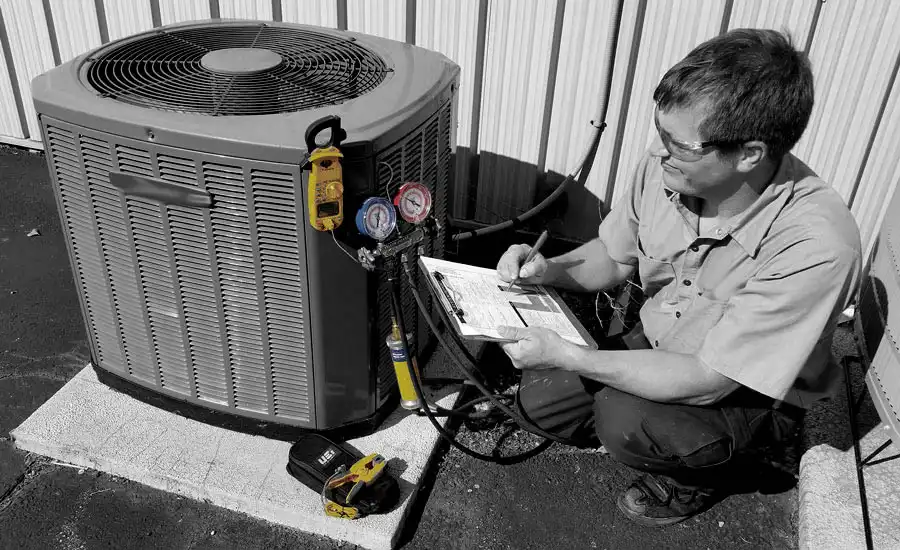Houston, Texas, known for its hot and humid climate, is no stranger to the essential role of air conditioning systems. For residents and business owners in this sweltering city, a functioning air conditioner can mean the difference between a comfortable environment and a miserable, sweat-soaked ordeal. But have you ever wondered how your air conditioner keeps your space cool, or why it’s crucial to maintain it regularly? In this blog post, we will explore the intricate workings of air conditioners, the importance of routine maintenance, and what you can do to keep your cooling system running efficiently.
The Complexity of Air Conditioners
Air conditioning systems are marvels of engineering, and their efficiency depends on a multitude of components working harmoniously. These systems don’t just blow cold air into your space; they regulate temperature, humidity, and air quality, ensuring your comfort. Let’s take a closer look at some of the essential components and functions within your air conditioner:
- Refrigeration Cycle
At the core of an air conditioner is the refrigeration cycle. This cycle involves the evaporation and condensation of a refrigerant, which absorbs and releases heat. The refrigerant circulates through a series of coils and is responsible for cooling the air that enters your space.
- Compressor
The compressor is like the heart of the system, as it pumps the refrigerant through the cycle. It increases the pressure of the refrigerant gas, which allows it to absorb more heat from your indoor air.
- Evaporator Coil
This coil is located inside your home or business and is responsible for absorbing heat from the indoor air. As the refrigerant evaporates, it cools the surrounding air and delivers cool air into your space.
- Condenser Coil
The condenser coil is located outside your building and is responsible for releasing the heat absorbed from the indoor air. It plays a crucial role in the cooling process, allowing the refrigerant to cycle back inside to absorb more heat.
- Air Filters
Air filters within the system are essential for maintaining air quality. They trap dust, allergens, and particles, preventing them from circulating through your space.
- Thermostat
The thermostat is the control center of your air conditioner. It allows you to set the desired temperature and ensures the system runs until that temperature is reached, then cycles on and off to maintain it.
These are just a few of the key components in an air conditioning system. For your system to operate efficiently, all these parts must work together seamlessly. Even a minor malfunction in one of them can lead to decreased efficiency and, eventually, a breakdown.
Signs of Inefficient Air Conditioning
Now that we understand the complexity of air conditioners, it’s crucial to recognize the signs that your system might be running inefficiently. Even if your AC has not suffered a breakdown, it may still be causing a range of issues for your unit and energy costs. Here are some indicators of an inefficient air conditioning system:
- Increased Energy Bills
One of the most noticeable signs of an inefficient air conditioner is a spike in your energy bills. When the system has to work harder to maintain the desired temperature due to malfunctioning parts or clogged filters, it consumes more energy, driving up your monthly costs.
- Inconsistent Cooling
If you notice that certain areas of your home or business are cooler than others, your AC may be struggling to distribute the cool air evenly. This could be due to a malfunctioning blower or a clogged duct system.
- Reduced Airflow
Inefficient air conditioners often have reduced airflow, meaning less cool air is being circulated into your space. This can lead to discomfort and the need to keep your AC running longer.
- Frequent Cycling
Your air conditioner should cycle on and off as needed to maintain the desired temperature. If it’s constantly running or cycling rapidly, it’s a sign of inefficiency and could lead to increased wear and tear on the system.
- Excessive Humidity
Air conditioners help regulate indoor humidity levels. If your space feels more humid than it should, your AC may not be functioning optimally, and you’ll be left feeling less comfortable.
- Unusual Noises
Strange noises, such as clanking or banging, are signs that something is amiss in your air conditioner. These noises often indicate that a component is loose or damaged.
How Often Should You Schedule Maintenance?
For residential air conditioning units, it is recommended to schedule maintenance at least once a year. The best time for this maintenance is in the spring before the peak cooling season. By doing this, you can ensure that your system is in top condition and ready to handle the demands of a hot Houston summer.
Commercial units, on the other hand, may require more frequent maintenance. This is because they often work harder and are subject to greater wear and tear due to their larger size and constant operation. Commercial air conditioners should typically be maintained two to four times a year to ensure their reliable operation.
What You Can Do to Help Maintain Your AC
While routine maintenance from a professional technician is crucial, there are also steps that home and business owners can take to help maintain the efficiency of their air conditioning systems:
Regularly Change Filters: A Crucial Step in Air Conditioner Maintenance
One of the most straightforward yet essential tasks in maintaining the efficiency of your air conditioner is changing the filters regularly. These filters are the front-line defense for your indoor air quality and your AC’s performance. Clogged filters can spell trouble, as they reduce airflow and force your system to work harder, which, in turn, leads to increased energy consumption and higher bills. To keep your system in peak condition, you should check and replace or clean these filters every 1-3 months, depending on the type of filter and your specific needs. By doing so, you ensure that your air conditioner can effectively filter the air in your space and operate efficiently.
Keep Outdoor Units Clear: The Importance of Outdoor Unit Maintenance
For those with central air conditioning systems, it’s vital to ensure the outdoor condenser unit remains free of debris. This outdoor unit is where the magic of heat exchange occurs, and its performance is vital for efficient cooling. Leaves, grass, branches, or any other obstructions around the condenser can hamper its ability to dissipate heat effectively. This not only affects the overall efficiency of your air conditioner but can also lead to overheating and system damage. Adequate airflow around the condenser is essential for maintaining a comfortable indoor environment. Regularly clearing the area around the outdoor unit can go a long way in preserving your AC’s efficiency and longevity.
Seal Leaky Ducts: The Hidden Culprits of Energy Waste
If you have a central HVAC system, inspecting and sealing any leaks in your ductwork is an often overlooked but critical aspect of maintaining your air conditioner’s efficiency. Leaky ducts can lead to significant energy waste and inefficient cooling. When there are gaps, holes, or disconnections in your ducts, cool air can escape before reaching its intended destination, forcing your air conditioner to work harder to compensate for the losses. Sealing these leaks not only saves energy but also helps maintain consistent and comfortable temperatures throughout your space. Regular duct inspections and repairs can contribute to both energy savings and overall system efficiency.
Maintain a Consistent Temperature: The Smart Way to Operate Your AC
It’s tempting to make sudden and drastic adjustments to your thermostat when you’re feeling too hot or too cold. However, such practices can strain your air conditioner and lead to inefficiencies in temperature control. Gradual adjustments to your thermostat allow your system to run more efficiently. When you set your thermostat to a constant and comfortable temperature, your air conditioner doesn’t have to work as hard to meet the desired conditions. Sudden temperature changes often result in frequent cycling, which can wear out your system faster. By practicing patience and making gradual temperature adjustments, you can help your air conditioner maintain the desired temperature efficiently.
Invest in a Programmable Thermostat: Optimize Comfort and Savings
Modern technology can be a significant ally in maintaining the efficiency of your air conditioner. Investing in a programmable thermostat is a smart move. These thermostats allow you to set temperature schedules that optimize your system’s performance based on your daily routines. For example, you can program the thermostat to reduce cooling when you’re not at home or during the night when temperatures are naturally lower. This prevents your AC from running unnecessarily, saving energy and reducing wear and tear. Programmable thermostats are a convenient way to balance comfort and savings while keeping your air conditioner in peak condition.
Consider Window Treatments: Managing Sunlight for Efficiency
Sometimes, it’s the simple things that can make a significant difference. Window treatments like blinds or curtains play a role in helping your air conditioner run more efficiently. They can block out direct sunlight, which, when allowed to enter your space, can raise indoor temperatures and increase the workload on your air conditioner. By managing sunlight and reducing heat gain through your windows, you ease the burden on your AC system. This means it doesn’t have to work as hard to maintain a comfortable temperature, leading to energy savings and more efficient operation. So, consider installing window treatments that suit your aesthetic preferences while assisting your air conditioner.
For both residential and commercial units, regular maintenance is an investment that pays off in lower energy bills, improved air quality, and an extended system lifespan. Additionally, there are steps you can take as a homeowner or business owner to assist in maintaining the efficiency of your air conditioner. By changing filters, keeping the outdoor unit clear, sealing duct leaks, and maintaining a consistent temperature, you can contribute to the efficient operation of your AC system.
In a city like Houston, where hot and humid weather is a common challenge, keeping your air conditioner in top shape is not just a matter of comfort; it’s a necessity. So, remember to schedule your annual maintenance check, and with some simple DIY maintenance, you can ensure your air conditioner keeps you cool and comfortable, while also saving on energy costs in the long run.
LoneStar Heating and Cooling
7941 Katy Fwy #287
Houston, TX 77024
713-266-2552
View our Google Listing

